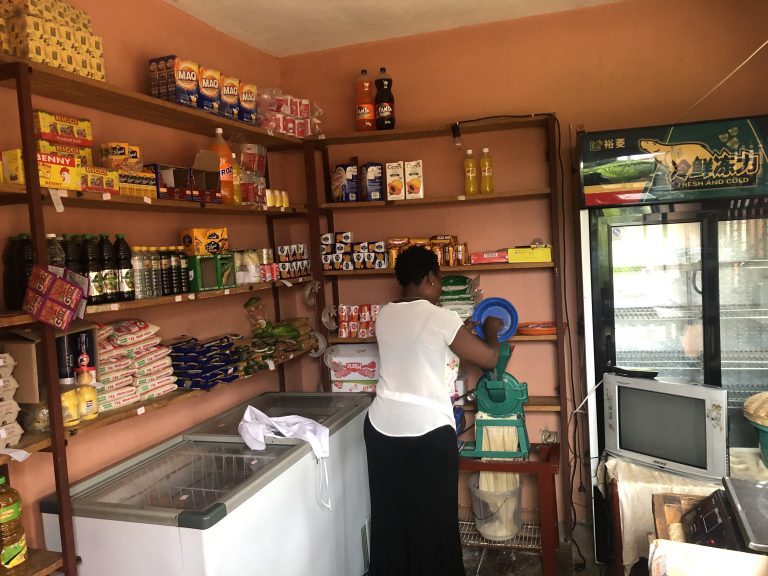
How Business Survival Plans are Helping Entrepreneurs in Mozambique
In Mozambique, shopkeepers like Angélica Novela often lack the business and financial management skills they need to run profitable businesses. The Business Women Connect program in Mozambique connects women entrepreneurs with the knowledge, training, and tools they need to become successful business owners.
Angélica Novela is a 46-year-old businesswoman and mother of four who owns a small grocery shop in Maputo, Mozambique.
Aiming to increase her family’s income and pay for her children’s school fees, Angélica decided to open the business six years ago, selling food and household products.
And she was doing well.
But when the COVID-19 pandemic reached Mozambique, Angélica faced one of her hardest moments as a business owner. Mozambique was hard-hit by the pandemic, with high infection rates and a slow vaccination rollout.
And, like many other countries, Mozambique had implemented lockdown measures that included stay-at-home orders and closures of schools and businesses.
Angélica Runs Nut Grinder, Weighs Powder, and Serves Customers
Angélica decided to temporarily suspend the business, thinking that the situation would improve in the short term. After seeing no progress, she considered selling all the products she had at very low prices in hopes of at least recovering her invested capital.
In a situation that seemed increasingly bleak, Angélica was holding on to a sliver of hope. Just days before she had been invited to join the Business Women Connect (BWC) program, a partnership between TechnoServe and ExxonMobil Foundation that connects women entrepreneurs in Mozambique with the knowledge, training, and tools they need to become successful business owners.
Angélica Deepens Her Entrepreneurship Skills
Through the BWC program, Angélica started gaining essential financial, merchandising, and inventory management skills. And, in a difficult, unpredictable business environment, Angélica learned ways to survive and adapt.
“The training taught me that we don’t need much to save and that we can use the savings to diversify the business and attract customers,” she says.

Business Survival Plans Help Entrepreneurs Navigate Even the Most Challenging Crises
One of the most important lessons for Angélica – which she put to use right away – was developing a “business survival plan.”
Determined to make her enterprise succeed despite the pandemic, Angélica did market research to see what other products her customers needed and how her new skills could create a better customer experience. Through this research, Angélica discovered that her customers traveled long distances to buy groundnuts, a daily necessity for many Mozambican families.
“I decided to invest my savings into the purchasing of a peanut grinding machine that is yielding me between 200–350 MZN ($3–$5.50) additional sales per day – besides the fact that I am becoming a reference in the neighborhood,” she reports.
Angélica’s creative thinking and commitment to applying her new skills has paid off – literally. Since putting her BWC training into practice, Angélica has increased her sales from $300 to $500 per month.
With hope that better days are ahead for her business, Angélica plans to continue saving for additional peanut grinding machines in order to reach new markets all over her community.

“I feel that because of the training I am sufficiently equipped with tools and skills that will enable me to reach my full potential as a businesswoman, acquire more grinding machines, and help in the development of my community,” she says.
What’s Ahead for Entrepreneurs in Mozambique
In the coming year, TechnoServe will train an additional 250 women like Angélica. The support will come at a crucial time, as entrepreneurs around the country grapple with the destabilizing impact of the COVID-19 pandemic and an increasingly violent insurgency in the country’s north. The program will continue to provide training on business investment, financial management, customer service, and marketing through digital channels while COVID-19 restrictions remain in place in order to ensure business continuity for micro-entrepreneurs.
Growing Focus on Micro-Retailers Through Pandemic
Small shops, or “micro-retailers,” are critical to local economies in developing countries, selling $11 trillion worth of goods annually. In some countries, small shops sell 80-90% of all consumer goods, often focused on communities and consumers missed by larger retailers.
If these local entrepreneurs could reach their full potential, their businesses would be game-changers for developing economies. But a lack of business skills and access to markets and financial services holds them back.
Developing countries can benefit immensely from investing in the business skills and access to markets and financial services that holds back micro-retailers like Angélica.
Supporting these micro-retailers has become a pillar of TechnoServe’s work, especially throughout the pandemic.
Through delivery of a combination of in-shop advisory services and group training, TechnoServe has helped more than 7,000 small shops increase their sales and profits and create jobs.
TechnoServe programs work with shop owners on best practices in:
- Shop management and customer care
- Sourcing and inventory management
- Record-keeping
- Merchandising
TechnoServe also helps store owners to form business groups that facilitate bulk ordering and direct linkages to suppliers and manufacturers. For Angélica, this type of training enables her to work through anything that the pandemic may bring with optimism and resilience.








